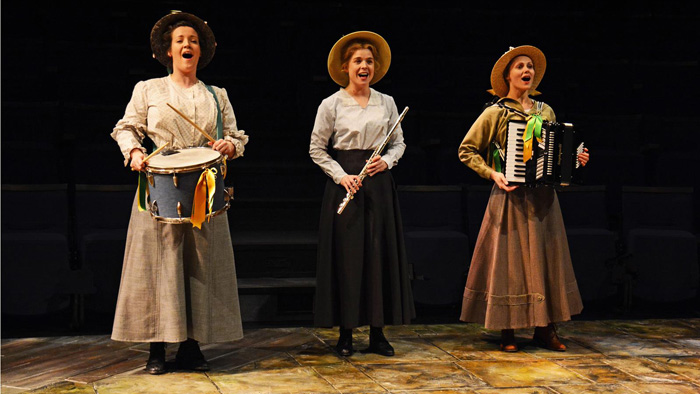This is a time when farmers and mill workers can rest from their year-round toil, the highlight being the annual Rushbearing festival, when a decorated cart is pulled through the streets accompanied by Morris dancers. The forces of war may already be mobilising around Europe, but they are as yet a distant rumble for these villagers. In this long established community, families like the Farrars and the Armitages have rubbed along side by side for generations; not without their hardships, as working conditions at the nearby mill have all too often taken their toll.
An August Bank Holiday Lark is a significant piece of new writing by Deborah McAndrew, who has collaborated previously with Northern Broadsides and teaches at Staffordshire University. It was originally performed in the round at the New Vic Theatre in Newcastle-under-Lyme, the theatre of my childhood where I still recall first seeing Mary Shelley's Frankenstein. The force that is Barrie Rutter (the man who cast Lenny Henry as Othello) not only commissioned and directs the play but also takes the role of John Farrar with great distinction and draws some excellent performances from his capable cast. Lauryn Redding in particular is notable as the often comic mill worker Susie Hughes.
The play's set and costumes are reminiscent of War Horse, with Joey replaced by a Rushcart; a marvel of construction built and dismantled again for every performance. Adapted for the proscenium arch, on a few occasions it does feel as though the cast has too far to run on and off stage. Then, in the wedding breakfast scene, the table is mysteriously set right at the back, so that even those of us in the stalls are unable to see clearly what's going on (my theory is that the cast have eaten all of the much admired wedding cake and are having to cover this up).
An August Bank Holiday Lark is by turns a funny, sad, wise and ultimately moving commemoration of the centenary of the outbreak of the First World War. It embodies the transition in Larkin's poem, to a world where those flowering grasses are 'shadowing Domesday lines under wheat's restless silence' and there is 'never such innocence again'. This play deserves to be seen and pondered over by as wide an audience as possible, lest we should ever dare to forget.
Photos courtesy of Northern Broadsides. An August Bank Holiday Lark continues on tour until 14th June 2014, details here.




No comments:
Post a Comment
I'd love to hear what you think! Please let me know in the box below